“When it comes to the care of our common home, we are living at a critical moment of history.” – pope francis
Pope Francis’ quote is from one of his famed encyclicals: Laudato Si. This encyclical emphasizes humanity’s obligation to care for our common home. At Jesuit, the Environmental Society is working to uphold that standard every day. The objective of the Environmental Society is to partake in preservation, signal awareness of our daily habits, and reduce detrimental impacts in our community. Previously known as the Recycling Club, this student organization has been tirelessly conducting several projects on and off campus. Under the guidance of moderators and student leaders, the Environmental Society has been a tremendous benefit to Jesuit Dallas. Recently, I conducted interviews with Mrs. Applegate and Mr. Wood (moderators) about their work, projects, and future plans.
A few years ago, this organization was established as the Recycling Club. What did the Recycling Club do back then? What was the transition between the Recycling Club to the Environmental Society?
Mrs. Applegate: 2019 was my first year at Jesuit. During my first year, two students expressed interest in forming a recycling-driven club. So, the Recycling Club was established with Mr. Wood and I being club moderators. These students’ primary objective was to collect the recycling blue bins around campus and dispose of trash as necessary. As the Recycling Club’s operations expanded, Mr. Wood and I discussed if it would be best to pivot towards being an environmental club. For instance, members and I started to talk about composting and other environmental issues during our meetings. So, our primary objective shifted from recycling to environmental awareness.

Mr. Wood: As the Recycling Club, we were primarily focused on recycling efforts on campus, cleaning projects after school, etc. A lot of conversations were about recycling specifically and learning about the process. Last year, we decided to change the club to the Environmental Society. The reason is that we wanted to make the club broader so students interested in various aspects of environmental issues could join. For instance, we have guys who are interested in discussing specific environmental topics and constructing a terrarium in the Science Commons. So, we just wanted to widen the options for students.
In the beginning of the school year, how did you advertise and encourage students to join the Environmental Society?
Mrs. Applegate: Since the two starting members’ graduation, there were a handful of underclassmen who started to take the initiative. I knew that I was going to be very busy during the fall because I have an internship. So, during the first week of school, Mr. Wood set up a booth outside the cafeteria to advertise the club to all classes.
Mr. Wood: After attracting a good number of students to join the club, I asked current and new members to invite their friends to attend our weekly meetings. So, we kind of built a roster of students from there. Since then, in order to remind members of meeting times, I sent Rangernet messages and had the times announced in the morning.
During the first semester, what did you plan and initiate? What was the main concentration/focus of this year?
Mrs. Applegate: I think this is what we are trying to figure out. Now we are the Environmental Society. The following questions are always at the back of our heads regarding the club’s function and goal: What does that mean for us? What should we focus on now that we have a broader title? So, we decided to initiate composting projects and construct a terrarium on campus. In addition, we received a monetary donation and a recycled bike rack. But, the goal of the club is to figure out what our concentration should be pinpointed on next.
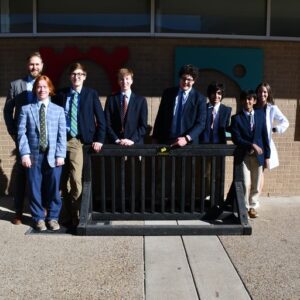
Mr. Wood: Usually, our meetings consist of updates on the latest objectives or initiatives. Various initiatives included setting up a terrarium in the Science Commons, repurposing garden boxes behind the LRC and creating a greenhouse space, and encouraging carpools to reduce carbon emissions. Also, some students brought up the idea of cleaning invasive species at the Trinity Audubon Center. So, guys would bring up different initiatives and other interested members would latch on to participate and help.
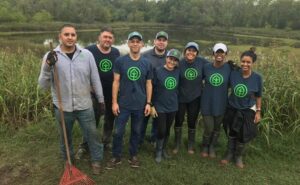
For the second semester, what are you planning to do next? Do you have any objectives in mind?
Mrs. Applegate: The club is currently trying to decide where we want to focus our efforts this spring. It sounds like we may try to start a small-scale composting site on campus and see how sustainable/ effective that could be at reducing waste.
Mr. Wood: I would say that there is a decent amount of focus on reinforcing the school’s recycling practices. As mentioned before, another concentration is on the terrarium project in the Science Commons. Those are our two short-term goals. Someday, we hope to work with the school to build a rooftop greenhouse space and solar panels, even though we haven’t started anything yet. But, I believe that the projects mentioned above will help our campus be more green in the future.
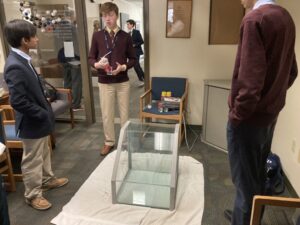
What is the main importance of knowledge of environmental issues? How can we improve our understanding and apply them to our daily lives?
Mrs. Applegate: I feel that being environmentally conscious is related to one the Jesuit profiles of the graduate, which is being committed to justice. Understanding how the school positively and negatively impacts the environment is a big part of being committed to justice. I don’t think that everyone on this campus has to be an environmental activist. However, I believe that helping students to be educated in environmental science and issues pertaining to the subject is important.
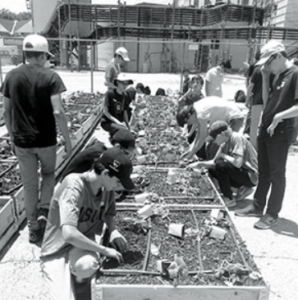
Mr. Wood: Understanding environmental issues and increasing awareness is crucial for all of us. I think that having something tangible and realistic will help students work towards a more environmentally-friendly campus. For example, we are planning on doing Earth Day projects. In April, I am trying to host a campus-wide event or activity to bring awareness to our individual practices in terms of their energy usage, their consumption of products, etc.
One of the Jesuit principles on environmental justice is to promote sustainable environmental policies, care for the vulnerable, and prioritize humanity over profit. How does this principle relate to your personal commitments?
Mrs. Applegate: My devotion centers in education. Through my college career at Indiana and teaching in Kansas, I just became more interested in environmental science. I feel like that organically evolved over time. Personally, I believe in a well-rounded understanding of environmental science’s function and relations to society and understanding of its difference from environmentalism. Do I want everybody to compost and make 5 minute showers? No, I think that would be unrealistic. But, I think that students’ understanding of their impacts on the environment can help us make better decisions as they grow and evolve. Overall, building good habits will be essential in college and adult life.
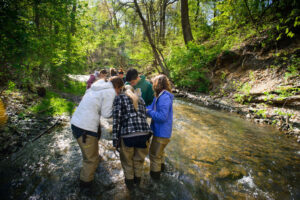
Mr. Wood: Along with the Catholic Social Teaching’s theme of Care for Creation, I believe that the Jesuit principle ties directly into our mission. For our individual development, it is about raising awareness about our personal decisions. We also have power over our daily decisions, which can have significant impacts on our environment. Serious questions include whether we recycle or not, whether we carpool or not, or do I buy products that are not good for the environment. Moreover, a good opportunity for students would be cleaning the creek near our campus. It’s not just believing in broad phrases like “I love the Earth” in an altruistic way, but also thinking about future generations. Having a greater awareness of our choices and thinking about our future are essential to maintaining our environment.
In the end, what primary message would you like to share with us?
Mrs. Applegate: My biggest piece of advice for the Jesuit community on how to become environmentally aware and conscious is to think critically about your own actions and to educate yourself as much as possible. For example, if you think about the food you’re eating every time you take a bite and ask yourself where it comes from, how far it traveled to make it onto your plate, how it was prepared, how it was grown or raised, then it will help you become more conscious of how your choices can positively or negatively impact our community and environment. By asking yourself critical questions about things we take for granted daily it will hopefully inspire you to educate yourself on alternatives or environmentally conscious actions you can be taking, or at least help you stop and think for a second about your ecological footprint.
Mr. Wood: Regarding environmental practices and the function of the club, my main piece of advice would be to make environmentally friendly choices that are not difficult. If you cannot come up with anything, then you can always research quick guides and practices on how you can make your life more sustainable. Please do not be daunted or intimidated by not knowing what to do. There is a lot of solid information on little actions, including what you can do today and tomorrow. Examples include turning the lights off when not using the room and not leaving the faucet running. By being committed to these actions, you can build a daily habit from this. Personally, I think the main thing is that students either are not sure of specific actions or (are) daunted by the seemingly overwhelming requirements. Sometimes, I do not exemplify all of the consummate aspects of environmental awareness. But, I am always trying to improve my habits every day and in the future.
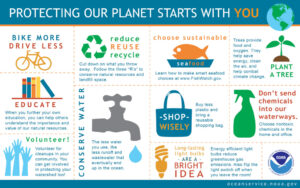
The Environmental Society meets weekly during Thursday community times. If you are interested in joining, please contact Mrs. Applegate or Mr. Wood. Stay tuned to The Roundup for more news about our student organizations like the Environmental Society.






